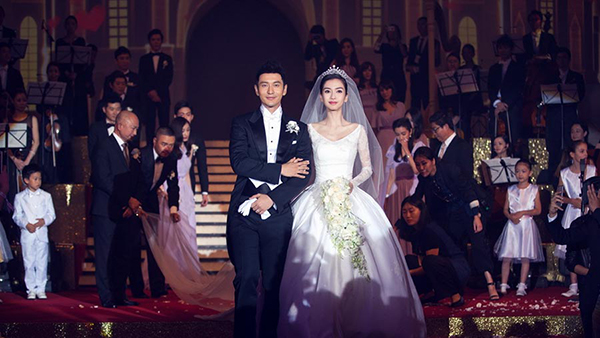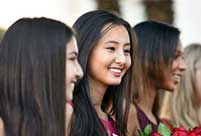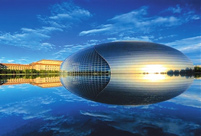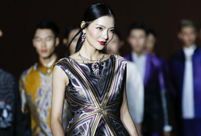

 |
| Chinese actor Huang Xiaoming (left) and his actress wife Angelababy pose during their wedding ceremony at the Shanghai Exhibition Center in Shanghai on Oct 8. [Photo/Xinhua] |
The wedding of celebrity couple Yang Ying, better known by her stage name Angelababy, and Huang Xiaoming took place last week, with Chinese celebrities turning out in force to attend the free-publicity carnival. The occasion generated a lot attention, as intended, but not all of it was favorable. One criticism of the couple that created a particularly big buzz on social media was the xizi, a contemptuous term for actors, had stolen the limelight from Tu Youyou, who won China’s first Nobel Prize in physiology or medicine.
The wedding was an extravaganza, not least because the couple milked it for all it was worth. From the bride’s wedding ring to gifts for the guests, the wedding, which reportedly cost nearly 200 million yuan ($31 million) in total, was heavily sponsored by a variety of brands. Since they are not the first celebrity couple, and they are unlikely to be the last, to use their wedding for commercial promotions, some netizens have spoken in defense of the newlyweds claiming that no one has the right to point a finger at them, because it is up to a couple to decide how they want their wedding.
But while this claim might appear to be valid, it is in fact untenable. Showbiz stars, when practicing their right as ordinary citizens to tie the knot, should still take into consideration the power of their public image. Residents and visitors near the Shanghai Exhibition Center, which was the venue for the wedding, complained it disrupted the neighbor and caused a nuisance because of the traffic congestion and huge crowd of fans and bystanders that gathered. This should have been expected, and could have been avoided.
Also, as public figures, celebrities have actually assumed a social role much bigger than they themselves maybe realize. Every decision, no matter how big or small, and their behavior is magnified under close public scrutiny and blindly supported and followed. In this sense, celebrities have the responsibility to act as role models. Even though it is not a legal obligation, they should positively guide public behavior.
But, back to the wedding; heavy media coverage was invited by the couple, which should come as no surprise given the above; there was even a live broadcast on a video website that further broadcast the extravagance of the event. This came in for criticism as it might encourage unattainable desires for such a luxury lifestyle among ordinary young people, and also give rise to the emergence of copycat celebrities keen not to be outdone in the glamour stakes.
However, the real controversy over the wedding carried on even after the revels were over, as the achievement of unassuming scientist Tu was said to have been overshadowed by the glitzy bash. There were accusations due attention had been “stolen” from Tu by Huang and Yang’s vulgar “reality-show” wedding.
This seems a step too far. First and foremost, there is simply nothing comparable between the two, and such a comparison that focuses on how much attention one gets or the money one earns, is unnecessary, even twisted.
The wedding, with so much commercial sponsorship, meant the couple inevitably sought as much media exposure as possible to maximize the interests of all parties, while the 85-year-old scientist, while happy to be recognized for her work, said she had not done it for fame and fortune.
Using the derogatory term xizi to label the newlyweds simply displayed the bias of the accuser and revealed the person’s contempt for the profession. Both Tu and the couple have made their achievements in their differing fields of work and it is totally unnecessary and meaningless to attack either for their success.
 Night life in Qingdao
Night life in Qingdao In pics: army beauties across world
In pics: army beauties across world Photos of beautiful teacher hit the Internet
Photos of beautiful teacher hit the Internet Winding mountain road
Winding mountain road
 Math teacher makes 'solar powered electric car'
Math teacher makes 'solar powered electric car' Heavy traffic turns expressway into huge parking lot
Heavy traffic turns expressway into huge parking lot Chinese-American girl selected as Rose Parade princess
Chinese-American girl selected as Rose Parade princess Top 10 nominated designs at BJDW
Top 10 nominated designs at BJDW Fashion show staged in Forbidden City at night
Fashion show staged in Forbidden City at night The last picture show
The last picture show Apples not the only fruit
Apples not the only fruit New Oz visas snapped up
New Oz visas snapped up Entrust diplomats to manage Japan policy
Entrust diplomats to manage Japan policyDay|Week